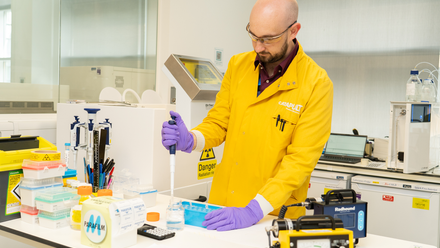TechBio: Future-ready biology

Our latest TechBio: Future-ready biology confirms a major structural shift in the UK life sciences sector: TechBio has moved from a niche field to the mainstream.
This approach, which merges data, AI, and biotechnology to accelerate innovation, consistently accounted for over 40% of all UK biotech deals in recent years, demonstrating its central role in future growth.
The report not only charts the immense potential of the UK’s TechBio sector for economic growth but also grounds our current successes in robust, long-term data and a realism check of the ongoing challenges as it matures.
Between 2020 and 2024, our ecosystem firmly established itself as a global leader, attracting over £2.6 billion in total capital across venture and public markets. This success was anchored by £1.5 billion in VC financing and major public market activity from companies like Oxford Nanopore and BenevolentAI. This investment underpinned a high volume of innovative activity, with TechBio consistently accounting for over 40% of all UK biotech deals in some years. Landmark events, such as the £489.6 million acquisition of Exscientia by Recursion, provided undeniable validation that UK science is creating world-class value.
The data also presents our key structural challenge: the scale-up gap. While our domestic ecosystem excels at the Seed and Series A stages, the limited number of Series B+ deals and the reliance on overseas capital for later-stage growth highlight the essential need to mobilise greater pools of domestic, late-stage funding. The journey from proof-of-concept to commercial endurance remains our defining challenge.
Whilst the incredible news of NVIDIA’s investment in the UK and Jenssen Huang’s promise that they “are doubling down to empower the UK to lead the next wave of AI innovation” are encouraging, we know at BIA that biology is challenging. The mutable nature of biological systems makes them challenging to model effectively and with additional regulatory and access protocols essential for patient safety and health economics, the barriers to progress for investors and funders can seem significant. Talk of ‘bubbles’ and ‘hype’ is inevitable, and AI is no magic bullet, however, there is little doubt that this technology will be the future of drug development, of biosolutions, of diagnosis, prevention and clinical implementation, and it will pay huge dividends to companies, investors and societies that embrace it.
This context makes the BIA’s strategic focus in 2025 more critical than ever and are responding directly to the need for scale and maturity:
- Our Data, AI and Genomics Advisory Committee (DAGAC) is focused on translating our scientific excellence into commercial scale by driving policy on UK data federation and access for SMEs, responsible AI regulation, compute power and genomics.
- The large, high-value funding rounds secured this year by companies like Isomorphic Labs, CHARM Therapeutics and Relation Therapeutics are powerful indications that the market is responding to the need for larger, high-value funding rounds.
- Initiatives like the #BIGIMPACT campaign, creating a talent pool and TechBio Boost focused on scaling TechBio are directly addressing the talent needs and supporting maturation of business models.
- We are continuing to champion the sector, to promote the incredible science, companies and opportunity to key stakeholders and policymakers, and are proud that TechBio’s central role has been officially recognised and incorporated in the Industrial Strategy – Life Sciences Sector Plan, Digital and Technologies Plan and the 10-year Health Plan published this year.
Key for the UK as a whole is that we have an opportunity to advance productivity and growth through the technological advances in artificial intelligence, life sciences and robotics that we celebrate in TechBio – if we are able to grasp this opportunity for the UK, if the government is able to continue on what it has promised in the Sector Plans through consistent implementation, then the potential will be truly transformative for the UK and beyond. As such the BIA will continue to call for health data infrastructure as a national priority, capital at scale, attracting world-beating talent and an improved commercial environment for life science companies in the UK.





